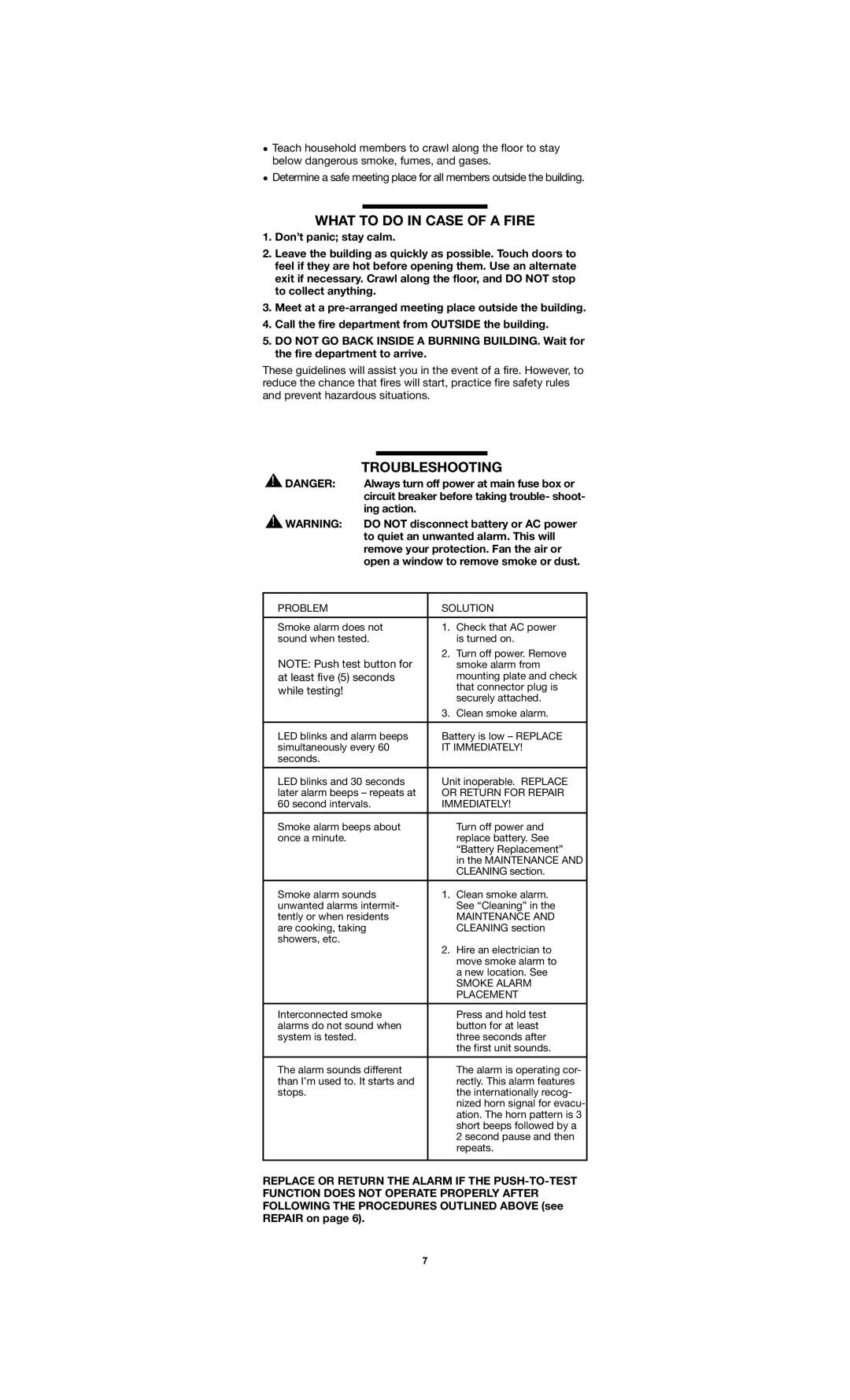
•Teach household members to crawl along the floor to stay below dangerous smoke, fumes, and gases.
•Determine a safe meeting place for all members outside the building.
WHAT TO DO IN CASE OF A FIRE
1.Don’t panic; stay calm.
2.Leave the building as quickly as possible. Touch doors to feel if they are hot before opening them. Use an alternate exit if necessary. Crawl along the floor, and DO NOT stop to collect anything.
3.Meet at a
4.Call the fire department from OUTSIDE the building.
5.DO NOT GO BACK INSIDE A BURNING BUILDING. Wait for the fire department to arrive.
These guidelines will assist you in the event of a fire. However, to reduce the chance that fires will start, practice fire safety rules and prevent hazardous situations.
! |
| TROUBLESHOOTING | |
DANGER: | Always turn off power at main fuse box or | ||
|
| circuit breaker before taking trouble- shoot- | |
! |
| ing action. |
|
WARNING: | DO NOT disconnect battery or AC power | ||
|
| to quiet an unwanted alarm. This will | |
|
| remove your protection. Fan the air or | |
|
| open a window to remove smoke or dust. | |
|
|
|
|
| PROBLEM |
| SOLUTION |
|
|
| |
| Smoke alarm does not | 1. Check that AC power | |
| sound when tested. | is turned on. | |
| NOTE: Push test button for | 2. Turn off power. Remove | |
| smoke alarm from | ||
| at least five (5) seconds | mounting plate and check | |
| while testing! |
| that connector plug is |
|
| securely attached. | |
|
|
| |
|
|
| 3. Clean smoke alarm. |
|
|
| |
| LED blinks and alarm beeps | Battery is low – REPLACE | |
| simultaneously every 60 | IT IMMEDIATELY! | |
| seconds. |
|
|
|
|
| |
| LED blinks and 30 seconds | Unit inoperable. REPLACE | |
| later alarm beeps – repeats at | OR RETURN FOR REPAIR | |
| 60 second intervals. | IMMEDIATELY! | |
|
|
| |
| Smoke alarm beeps about | Turn off power and | |
| once a minute. |
| replace battery. See |
|
|
| “Battery Replacement” |
|
|
| in the MAINTENANCE AND |
|
|
| CLEANING section. |
|
|
| |
| Smoke alarm sounds | 1. Clean smoke alarm. | |
| unwanted alarms intermit- | See “Cleaning” in the | |
| tently or when residents | MAINTENANCE AND | |
| are cooking, taking | CLEANING section | |
| showers, etc. |
| 2. Hire an electrician to |
|
|
| |
|
|
| move smoke alarm to |
|
|
| a new location. See |
|
|
| SMOKE ALARM |
|
|
| PLACEMENT |
|
|
| |
| Interconnected smoke | Press and hold test | |
| alarms do not sound when | button for at least | |
| system is tested. |
| three seconds after |
|
|
| the first unit sounds. |
|
|
| |
| The alarm sounds different | The alarm is operating cor- | |
| than I’m used to. It starts and | rectly. This alarm features | |
| stops. |
| the internationally recog- |
|
|
| nized horn signal for evacu- |
|
|
| ation. The horn pattern is 3 |
|
|
| short beeps followed by a |
|
|
| 2 second pause and then |
|
|
| repeats. |
|
|
|
|
REPLACE OR RETURN THE ALARM IF THE
7
